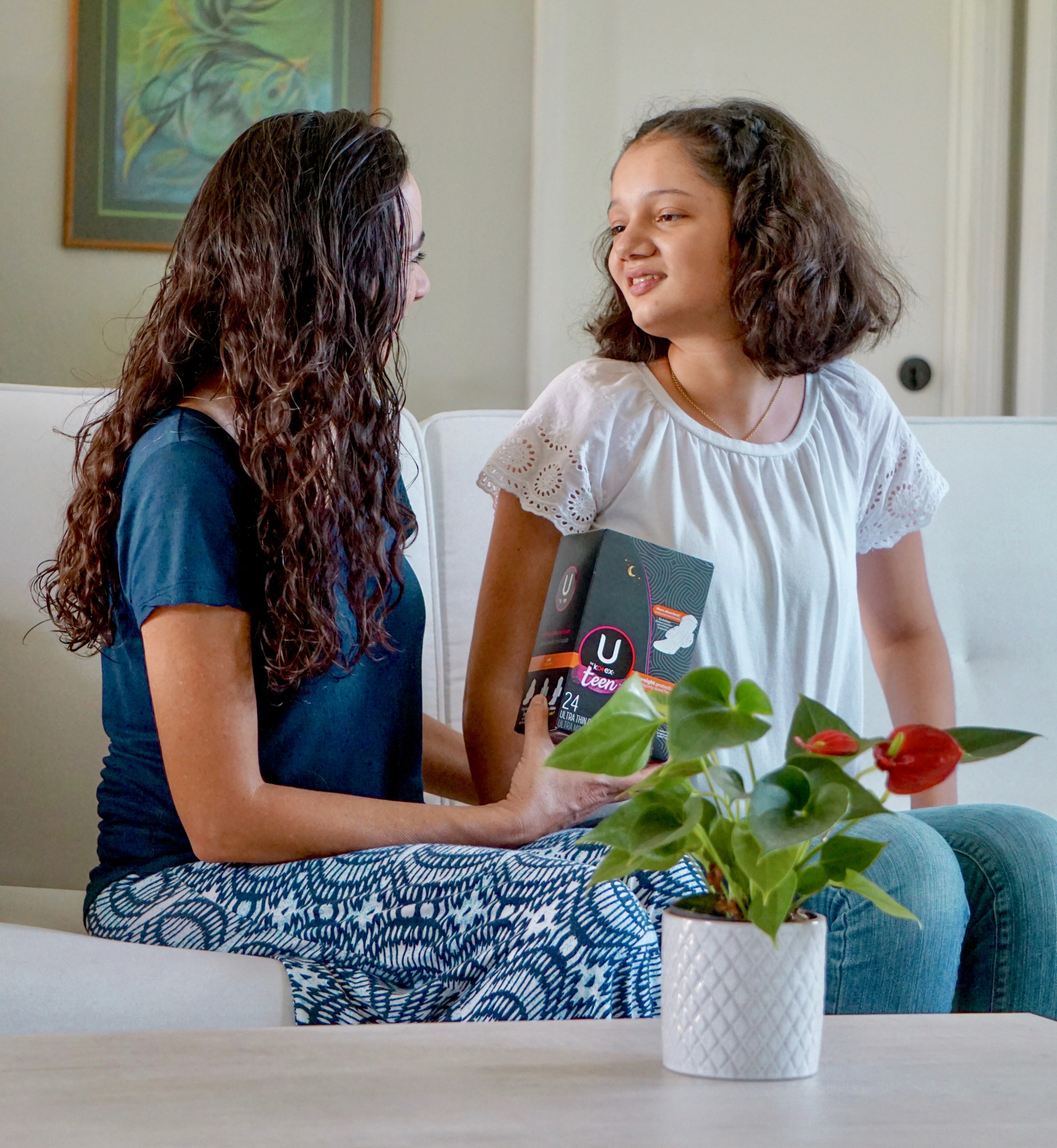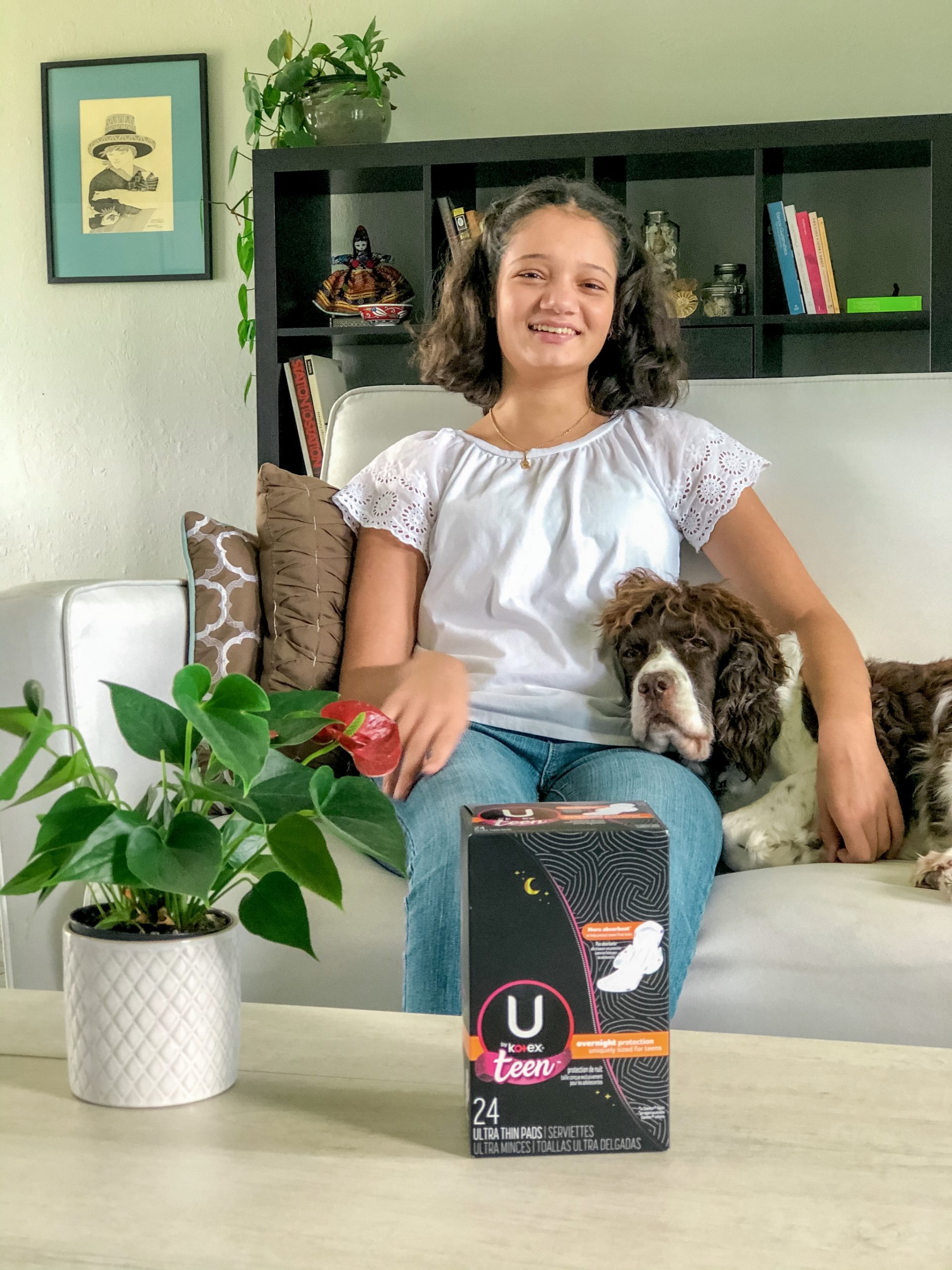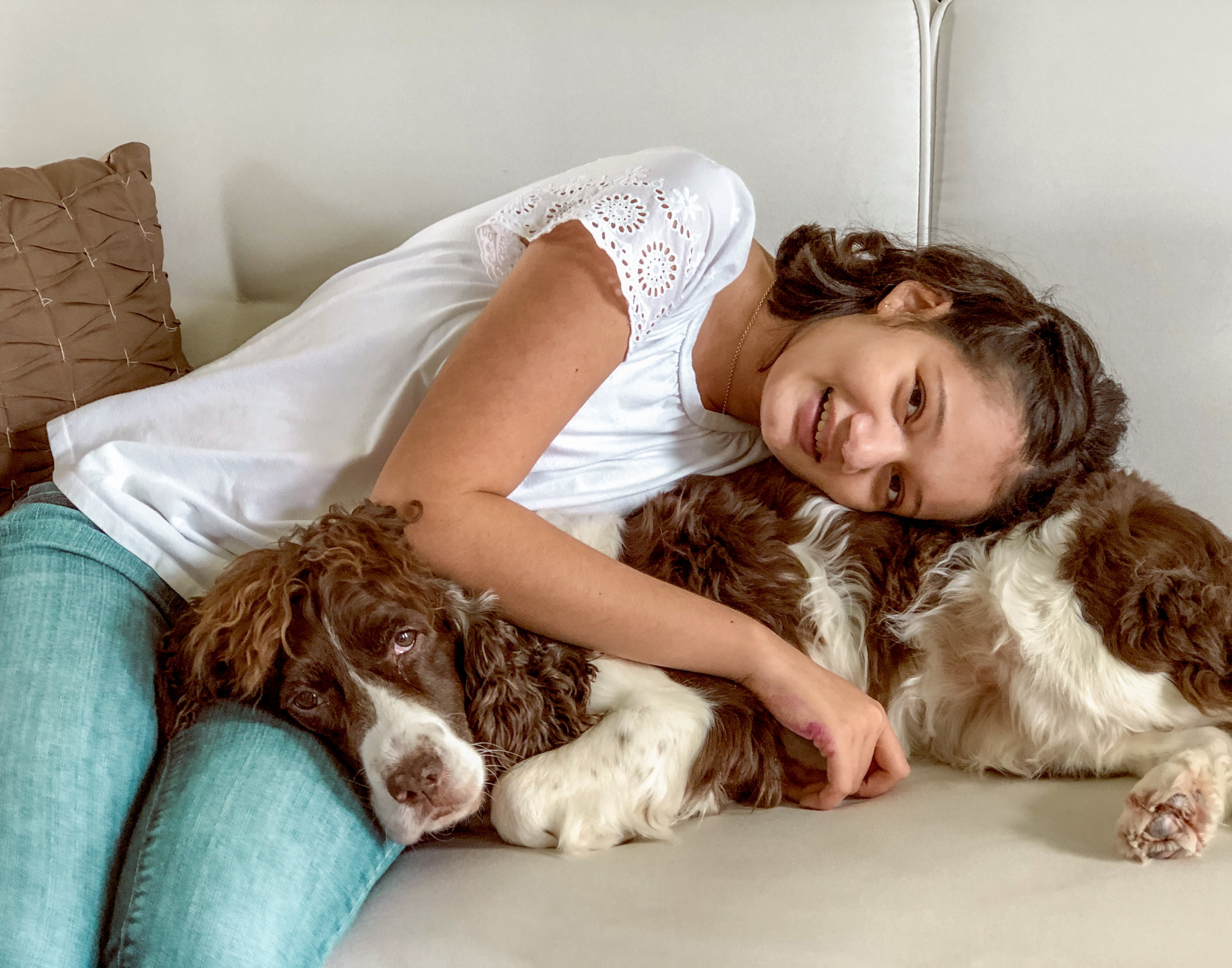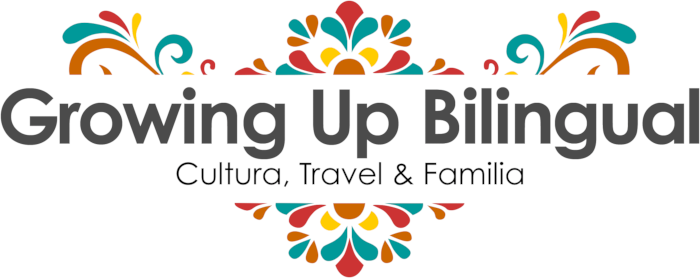Preparing your daughter for her first period or talking to girls about menstruation, in general, doesn’t have to be hard when you follow these tips for talking to your daughter about her period in a positive way.

Menstruation doesn’t have to be scary and talking about periods doesn’t have to be hard. Whether you’re preparing your daughter for her first period or helping your teen daughter realize that periods are a normal part of life, here are some ideas for normalizing periods and empowering girls.
How to Talk to Your Daughter About Her Period in A Positive Way
I still remember how awkward and unprepared I felt before having the first period talk with my daughter. I wanted to explain menstruation in a way that felt honest and positive, but I was also nervous. Growing up, my own first period experience was filled with embarrassment. My mom barely talked about it, and I felt like it was something to hide.
That’s why I wanted things to be different for my daughter. I wanted our puberty conversations to be empowering instead of frightening. The truth is that the way we talk about menstruation shapes how girls view their bodies, their confidence, and their self-esteem. By normalizing period talk, you not only prepare your daughter for the physical changes but also teach her that her body is something to be respected and celebrated.
Present the Period as Something Positive
As women, many of us grew up hearing about periods in negative terms—“the curse,” “that time of the month,” or something to dread. But the language we use matters.
When I first explained menstruation to my daughter, I made sure to highlight the positives. I told her that periods are a healthy sign of growth, a way our bodies show that they’re working properly. I explained that this change is part of becoming a young woman, and that it connects her to generations of women before her.
When we frame periods as something normal and positive, we give our daughters permission to see themselves as strong and capable, not ashamed or embarrassed.
Share Your Own Story
Girls often feel better when they realize they’re not alone. I shared my own first period story with my daughter—including the parts that were awkward. We laughed about how I tied a sweater around my waist at school and how I panicked when I didn’t have supplies.
By being vulnerable and sharing my experiences, I showed her that it’s okay if things don’t always go perfectly. It also gave her space to ask questions and admit her fears.
Get her involved in choosing the right products for her.
Every girl is different, and what feels comfortable for one might not work for another. That’s why I let my daughter have a say in the products she wanted to try. We talked about pads, liners, and period underware , and she experimented until she found what felt right.

Help Her Be Prepared
Leaks are one of the greatest fears for most girls. Knowing how to handle unexpected periods can reduce that anxiety.
My daughter carries a small “period backup kit” in her backpack. It includes:
- A pair of clean underwear.
- A couple of pads or liners.
- A plastic bag for used items.
- Wipes for quick clean-ups.
- Leggings rolled up tightly.
We also talked about what to do if she gets her period unexpectedly: covering up with a sweater, going to the nurse, or asking a teacher for help. Just having a plan gave her peace of mind.

Keep the Conversation Going
That first talk is only the beginning. Girls’ questions change as they grow. At first, it might be about what periods feel like. Later, it might be about mood swings, tracking cycles, or even how to explain menstruation to friends who don’t have theirs yet.
I make a point to check in regularly, sometimes casually:
- “How are you feeling today?”
- “Did you notice anything new before your period started this time?”
- “Anything that’s been hard lately?”
She doesn’t always want to talk, but she knows the door is always open. That ongoing support is what matters most.
Help Her Feel Empowered
When my daughter and I talked about periods, I reminded her that having her cycle doesn’t mean she has to stop doing what she loves. She adores horseback riding and hiking, and we talked about how she can still do those things—she just needs to be prepared.
I also pointed out that women she admires went through the same thing. Jane Goodall studied chimpanzees in the jungle while managing her period. Olympic athletes compete during their cycles. Knowing that successful women live their lives fully despite menstruation made my daughter realize she can too.
The message I wanted her to hear: your period is part of you, but it doesn’t define you or hold you back.

Encourage Self-Care
Periods can come with discomfort, and many girls feel guilty for slowing down. I wanted my daughter to know that self-care is just as important as staying active.
We created a list of things she could do when she wasn’t feeling her best:
- Using a heating pad for cramps.
- Drinking warm tea.
- Putting on fuzzy socks and watching a favorite movie.
- Journaling when she feels moody.
- Taking a nap or resting with her dog.
By naming these activities ahead of time, she felt more prepared and less helpless when symptoms showed up.

Normalize Period Talk in the Family
It was also important for me to normalize period talk in our whole family. My daughter knows she can ask her dad to pick up pads at the store and that she doesn’t need to whisper about being on her period around her brother.
Involving dads and brothers helps remove the stigma. It also teaches boys to be respectful and empathetic, since they go through their own puberty changes. When families treat periods as normal, girls feel more comfortable and supported.
Teach Practical Skills
Practical tools are just as valuable as emotional support. I taught my daughter to track her cycle on a calendar so she can anticipate when her period is coming. We talked about typical symptoms like bloating, mood swings, or cravings, so she knows what’s normal and when to reach out for help.
I also explained how often to change pads or liners and why hygiene matters. These everyday skills build independence and confidence.

Connect the Conversation Beyond Adolescence
Menstruation doesn’t stop being relevant once your daughter becomes an adult. I’ve talked to her about how her needs may change over time. For example, some women prefer different products after childbirth or during travel. Others turn to solutions like adult pull ups for women during postpartum recovery or for medical conditions.
By mentioning these options naturally, I showed her that managing your cycle is a lifelong process—and that it’s all about finding what works for you.
Extra Tips for Parents
-
Use correct terms. Avoid nicknames or code words; using “period,” “menstruation,” and “vagina” helps normalize the language.
-
Be patient. Your daughter may not want to talk right away. Keep the conversation light and ongoing.
-
Encourage questions. Even if she asks something awkward, answer calmly and without judgment.
-
Be mindful of cultural attitudes. If your family traditions see periods as private, gently balance respect for that with the need to normalize them for your daughter.
FAQs About Talking to Your Daughter About Periods
1. When should I start the conversation?
Before her first period—around ages 8–10 is ideal. Early knowledge makes her feel prepared instead of surprised.
2. What if I feel awkward?
Be honest. Tell her, “This wasn’t talked about much when I was your age, but I want you to feel supported.” Your openness builds trust.
3. Should I explain more than just bleeding?
Yes. Talk about the menstrual cycle as a whole—hormone changes, ovulation, and how this affects mood and energy.
4. How do I help if she’s embarrassed?
Normalize it with personal stories, humor, and reminders that millions of girls go through the same thing.
5. What if her period hasn’t started by 15?
Every girl is different, but check in with a doctor to make sure everything is on track. If you or your daughter ever feel unsure about the timing of her period or have health concerns, don’t hesitate to reach out to a trusted provider, such as Madison OBGYN, who can offer reassurance and expert guidance.
6. Should I involve teachers or coaches?
Yes, if she feels comfortable. They can provide support during activities or emergencies.
7. How can I help her feel confident at school?
Encourage her to keep a backup kit and remind her that teachers and nurses are there to help.
8. How do I handle cultural or family discomfort around periods?
Acknowledge those feelings but gently emphasize that periods are normal and healthy, not shameful.
Talking to your daughter about her period is about more than biology—it’s about connection, confidence, and empowerment. By presenting menstruation as a positive part of growing up, keeping the conversation open, and giving her practical tools and emotional support, you’re setting her up for a lifetime of confidence in her body.
The way we talk about periods with our daughters can change how they see themselves for years to come. And when we empower them with knowledge, reassurance, and compassion, we give them one of the greatest gifts: the ability to embrace their bodies without fear or shame.
More Helpful Parenting Articles for the Teen Years
Talking about periods is just one part of guiding our kids through adolescence. The teen years bring many changes—emotional, physical, and social—and as parents, we’re constantly learning alongside them. If you found this article helpful, you may also enjoy these resources designed to support you in raising confident, responsible, and connected teens:
-
How To Teach Teens Financial Independence
Helping teens understand money management early can set them up for lifelong success. This article offers practical ways to teach budgeting, saving, and smart spending—while giving your teen more confidence and responsibility. -
Parenting Teenagers: Advice That Focuses on Building Stronger Relationships
The teenage years can be challenging, but they’re also an incredible opportunity to deepen your relationship with your child. Here you’ll find strategies for keeping communication open, fostering trust, and creating a safe space for honest conversations. -
Safe Teen Driving: Teaching By Example
Teaching your teen to drive can feel overwhelming, but your influence matters more than you realize. This guide shares tips for modeling safe driving habits, setting boundaries, and helping your teen feel prepared behind the wheel. -
How to Help Kids Create Safe, Stable, and Nurturing Relationships
Friendships and relationships become more important during the teen years. Learn how to guide your child in building connections that are supportive, healthy, and long-lasting.
- Rappeling in Guatemala at Finca El Barretal - January 30, 2026
- How to Choose the Best Vacation Rental for Your Family Trip (Expert Tips for Stress-Free Planning) - January 6, 2026
- Cranberry Brie Cake Grazing Board (An Elegant Holiday Cheese Centerpiece) - December 19, 2025



I’m a firm believer in giving my girls all the knowledge they need about their bodies as they grow up. I think too many people still skirt around the female body and what happens to it, especially during puberty. Love this post.
Ah, yes, the talk! I remember this awkward conversation but speaking about it in a postive manner is the best way to approach it.
I am a long way off from having a daughter that age. I need to have kids first, haha. But this is great information, that I can remember, when that day finally comes. Or I will just have my future wife have the talk. haha
I like to think I did a good job with that talk with my oldest. Though I’m sure I could have been a little more positive.
I love this! Will definitely keep this in mind when that time comes for my daughter.
What you are describing, thats the way my mother talked to me when I was younger 🙂
Your daughter is lucky to have you! Period were a pretty open topic for me growing up and it’s made it easy to feel relaxed when I’m on my period. There is just less shame.
You are doing a great job talking to your daughter about menstruation. When I had my first period, I thought I was going to die. Seriously. My mom talked to me about it, but when the time came, I was scared. It was different with my daughter though. Both of us were prepared for that time.
This is all really good information. The key, which you touched on several times, is keeping communication open and easy. My youngest daughter is 19 so we are way beyond this, but because of the open communication from the start, we still talk daily about everything!
Thanks for these ideas – I didn’t have much discussion with my parents when I had my period. Glad to get tips for when I have a daughter 🙂
I love these suggestions to help take the stigma out of periods. I remember how awkward it was for me when I was a teen. Maybe my daughter will feel more comfortable about it!
This is such a great guide! Bookmarked so I can get back to this for when my daughter reaches this stage.
talking with your daughter is very important. i remember when my mum talked to me about the feminine mystique.
One of the dreaded talks if you’re a single dad. It’s still a long way for the talk to happen with my daughters but good thing I have my wife to do it.
U by Kotex® Teen pads seems like a good product. Great tips. i know it can be awkward to talk about it but it takes patience and courage to explain it to them.
I love that you had an open an honest conversation about periods with your daughter. I had a similar conversation with my own daughter.
I love that you had an open and honest discussion about periods with your daughter. I didn’t have that type of relationship with my mother and believe I would have had an easier time dealing with my period and what products to use if I had someone to guide me when I was young.
It is a time of great change in a teen’s life and the more information the better. I enjoyed your post.
Its mother duty to deal positively first time with her.
Its really hard time for her when she across this condition .
Otherwise thank you so much for sharing this post .